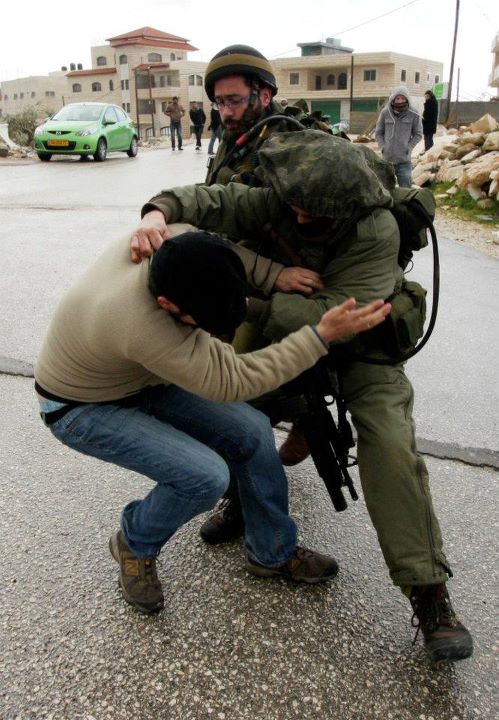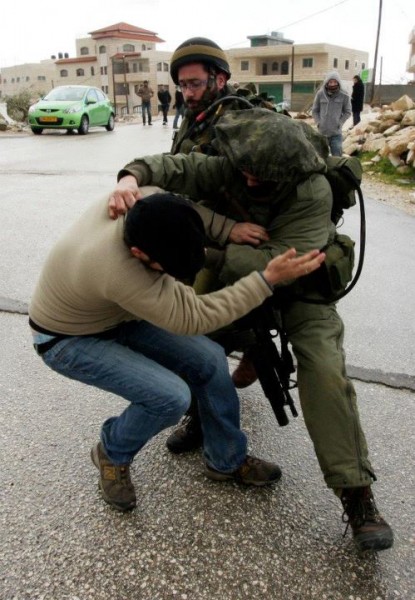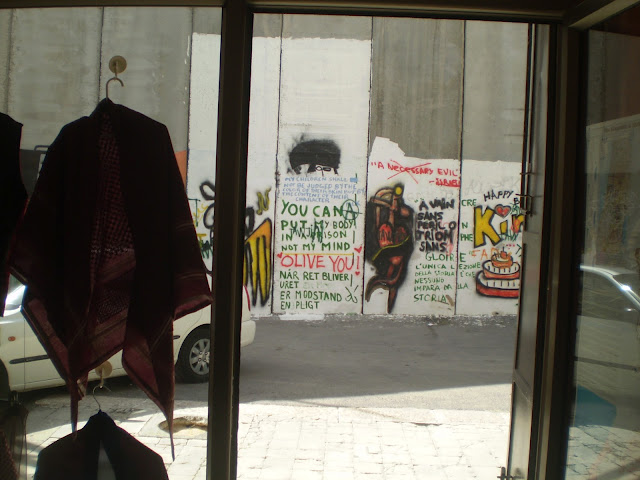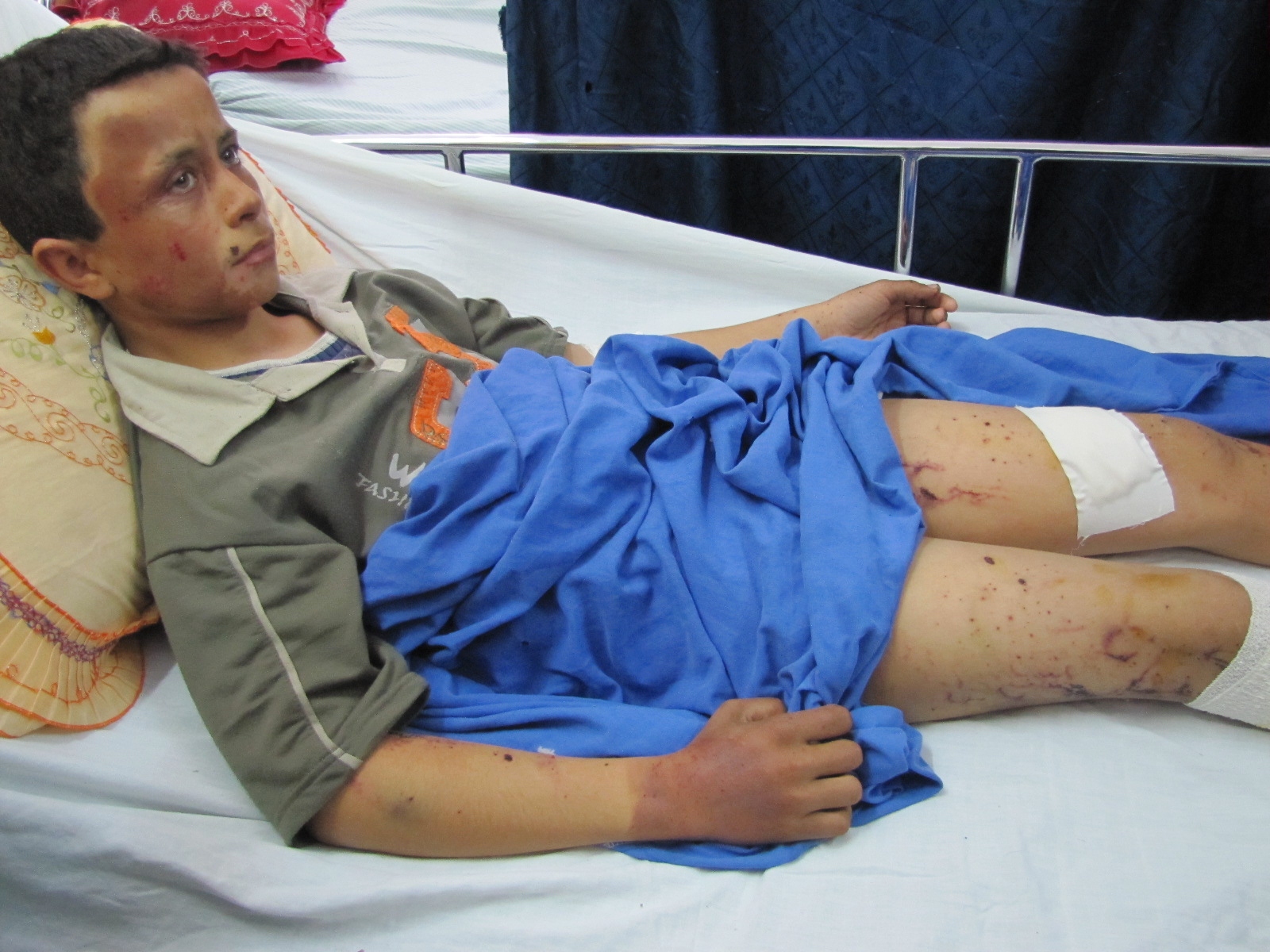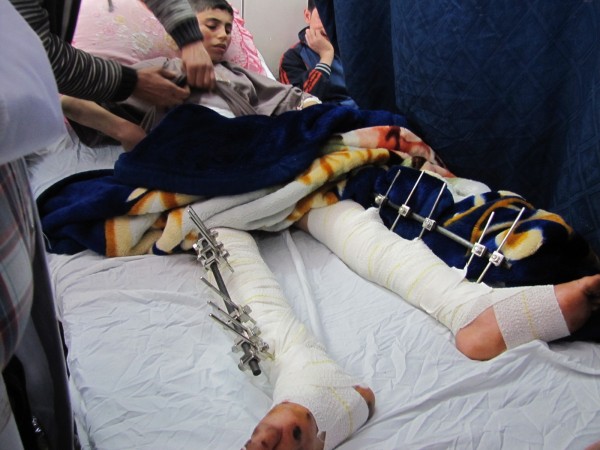Author: Yara
The isolated corner
by Axel
15 March 2012 | International Solidarity Movement, West Bank
In the outer part of Bethlehem very close to Rachel’s Tomb, Mariam (who wishes not to use her actual name) runs her small Palestinian souvenir shop. But this is not a shop in the usual touristic places of Bethlehem, and not a place you find if you don’t know about it.
Despite these facts, this small shop has become the only income for Mariam and her family since it opened two years ago.
Before 2002 her husband had an auto mechanic shop in this building, perfectly located right next to the main road to Jerusalem. The business was good back then. Palestinians as well as Israelis came here to get their car fixed or buy parts, and just next door, Mariam had a shop for home accessories. All this changed radically in 2002 when the area became a “military zone.”
Suddenly the road was closed and the family that lives on the floors above the shops became prisoners in their own home as soldiers turned their house into a military base. Sometimes they took a room or two, but other days the whole family of seven were forced to stay in one room without being able to go out.
Both shops had to close and life became hard. The next year in 2003, the Israeli government built the apartheid wall that is now surrounding the house from three sides. The land around them that is owned by her uncle was confiscated and is now on the other side of the wall, out of reach for the family that no longer can travel outside the West Bank without permission, a permission that is rarely given.
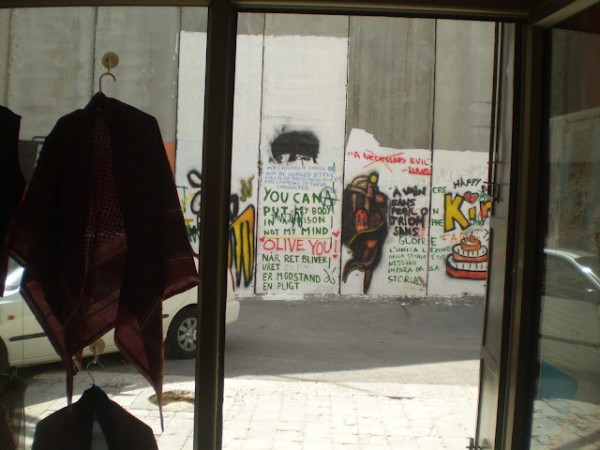
The travel situation was also different before the wall. Mariam, like other Christians, has strong bonds to Jerusalem, and she used to volunteer in a church in the city that she visited almost every day. It used to take her 15 minutes to get there. Now she only gets permission to visit Jerusalem for Easter and Christmas, and how long it takes to get there depends on the mood of the soldiers at the check point.
Today ten years later, the house is not occupied anymore, but no one can access the roof. Nor are they allowed to do any repairs, and the wall that surrounds the house has cameras pointed to watch every room, making private life close to nonexistent.
The small income from the souvenir shop is also highly taxed as the family lives in what is called Area C. This means that she has to pay taxes to the Israeli government like everyone in Area C is under direct Israeli control. But since Israel is not giving anything back to Palestinians for the tax money, like insurance, she also has to pay tax to the Palestinian Authority to get this covered.
“Life is not easy here,” she said, looking out the door at the 8 meter high concrete wall that has cut her family off from their former life, forcing them to live in an isolated corner.
Axel is a volunteer with International Solidarity Movement (name has been changed).
Casualties of the last attacks on Gaza: Visit to Shifa Hospital
by Rosa Schiano
15 March 2012 | il Blog di Oliva
This morning we went to pay a visit to the wounded at the Shifa Hospital. Most of them have fractures and burns.
Hani Al-Qanoo, 15
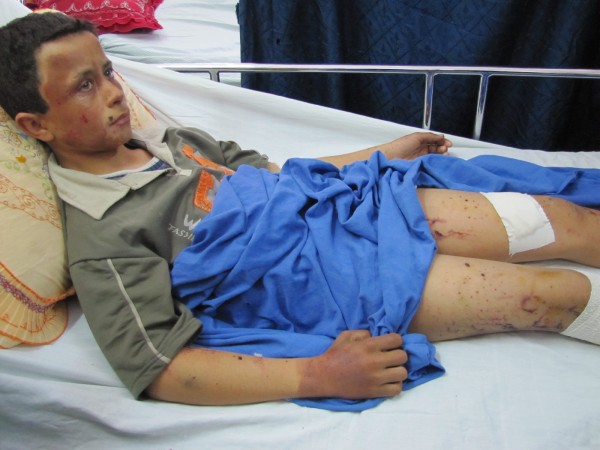
His mother, Reda, tells that on Sunday morning around 9am Hani and his brother went to school, but there were no classes. They were coming back home when a drone fired a missile on the same road where they were walking, Al Khorondar street.
Reda lives with her 7 children in difficult living conditions. Her husband died some time ago.
“We were coming back from school along with 6 of our companions when suddenly a drone hit us,” said Hani. “I had the sensation of flying.”
The doctor told us that Hani has a fractured femur in his right leg and several burns caused by the missile.
Moyad Al-Qanoo, 16
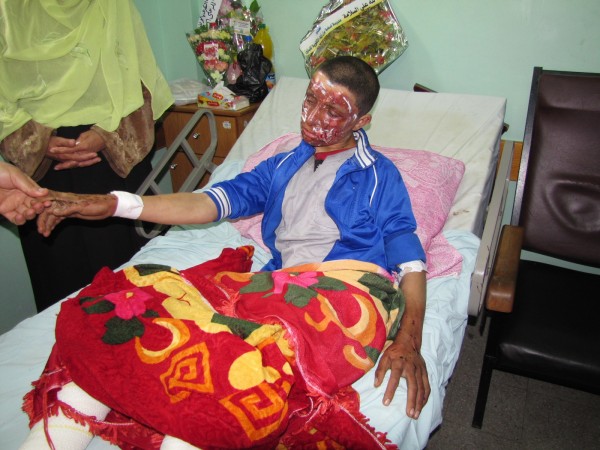
Moyad, was injured along with other friends, and one of their comrades, Nayif Qarmout,15, was killed. Moyad, who is Hani’s brother, reports injuries caused by second degree burns on the face and on the legs. He has shrapnel in various parts of his body.
Saleh Qarmout, 15
- Saleh Qarmout, 15 | Photo courtesy Rosa Schiano, 2012
Even Saleh Qarmout, 15, came home from school that day along with other classmates. The doctor told us that during the attack, a child had died, Nayif Qarmout, and 9 children were injured. Five children were taken to Shifa Hospital, and four children have been transferred at Kamal Odwan Hospital.
Tamer Azzam, 17
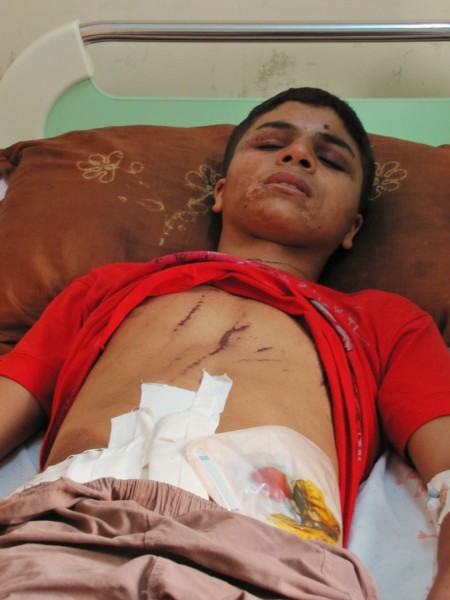
Tamer Azzam, 17, was coming back from school with them. We found him lying on a bed, and on his face showed the grimaces of pain. He has shrapnel to the face and side and burns to both legs. The doctor told us that they were obliged to partially remove his intestine. His recovery may take a long time. Tamer has 9 brothers and 2 sisters. His father is unemployed because he is sick.
Before I left, Tamer constantly set his eyes incessantly on mine. I looked at him, but because of the pain I felt, I looked away for a while. When I turned my look towards him again, I found his eyes still fixed on mine.
He stared at me in silence, aching, just like he was asking me some help through his eyes. I wanted to beat my fists against the wall, I wanted to shout and cry. I will never forget his gaze for the rest of my life.
Alaa Al Looh, 34
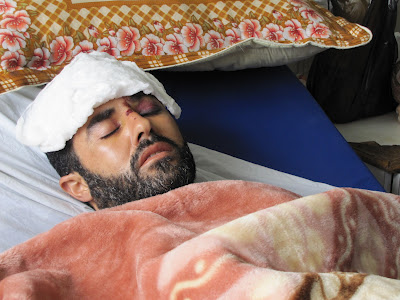
Alaa Al-Looh, 34, has a fractured tibia and burns to his face, caused by an Israeli attack that, on the same day killed a father and his daughter inside their factory. Mohammed Mostafa El Husseini was 85 and his daughter only 30.
Alaa was riding his motorcycle when he heard a loud explosion. He bounced on the ground and he woke up at the hospital. Alaa is married and has three children, two males and one female, and works in a fruit and vegetable shop.
When the doctor showed us his fracture, Alaa screamed in pain.

Hussien Omer Abo Aqla, 26
On the same day, Sunday 12 March, around 8am, Hussien was going back home after work. Hussien delivers food to the schools early in the morning. Suddenly a drone hit the road where he was travelling, Salah Addin Street, in the Al-Zeitouni neighborhood of east Gaza city. Hussien was injured in the back and he suffers from pressure to his chest.
Moath Nofal Abo El-Eash, 20
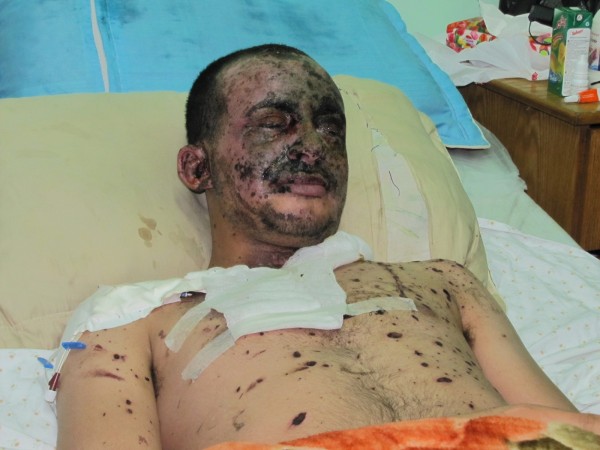
On Monday around 1:30AM two missiles hit Jabalia refugee camp, north of Gaza city. The first attack was carried out by a drone.
The missile hit the Hammad family home. More than 30 people have been injured, including 21 children. The house has been completely destroyed and others have been damaged.
Abo El- Eash’s house was close to the the Hammad’s family. Moath had heard the explosions, and his neighbors asked him to go out to try to save Hammad’s family. As soon when he got out of his home an F-16 launched another missile.
Moath has injuries from burns all over his body, particularly on his face and splinters in several parts of his body.
I asked him if he felt like telling a message to the world after what had happened to him.
Moath replied, “My image is enough to tell the world”.
Dr. Maher Sukkar, vice president of the plastic surgery department at Shifa Hospital, told us that they will ask to analyze the splinters from the weapons used in order to determine if they are carcinogenic.
Before saying goodbye, he told us that the weapons used are American.
“We need some freedom. Tell the world what you have seen in this hospital–why our children cannot have some room to play. Is it because we are Palestinians? My wife and I lived abroad for some time, but then we came back to Gaza despite the difficult living conditions, because our country needs us.”
Rosa Schiano is a volunteer with International Solidarity Movement.
Why did Israel stop me from visiting the West Bank?
by Alistair George
15 March 2012 | The Electronic Intifada
The standard line trotted out by Israeli politicians is that Israel is the only democracy among a sea of repressive Arab autocracies. Israeli Finance Minister Yuval Steinitz claimed recently that “Israeli democracy is alive, liberal and breathing; I don’t know many better democracies in the world” (“Government ministers react sharply to Clinton’s criticism of Israeli democracy,” Haaretz, 4 December 2011).
But what kind of liberal democracy bars human rights activists in an attempt to stifle the truth about its behavior?
My friend and I were recently held and interrogated by the Israeli authorities at the Egyptian/Israeli border for over nine hours before being denied access to Israel for unspecified “security reasons.” However, the true reasons appear to be politically motivated.
We had intended to travel to the West Bank to work with the International Solidarity Movement (ISM), a nonviolent, Palestinian-led group of activists who work alongside other international and Israeli groups to provide solidarity, document human rights abuses, undertake direct action and provide an international presence in the hope that it will inhibit the violence of the Israeli military in attacking unarmed demonstrators.
The Israeli authorities deny having a policy of forbidding entry to ISM activists. However, in reality, any person who admits to being a member is immediately denied access by the Israeli border authorities, blacklisted and prevented from entering in the future. The Israeli authorities also routinely deny access to other human rights activists, workers with non-governmental organizations and people stating an intention to help any group perceived by the Israeli authorities as being “pro-Palestinian.”
It would have been our second time working with ISM documenting human rights abuses, having visited the West Bank in late 2011, and regrettably we felt that we could not disclose our true reason for going and were forced to claim that we were going to Israel on holiday.
We arrived at the Taba crossing around 7am and so the stupidity began. My friend had been living in Cairo for the past four months and the authorities were very unhappy that she had studied Arabic while in Egypt. Although she is an atheist from a predominantly Christian country, they asked her when she became a Muslim — an incorrect assumption presumably based on the fact that she has spent time in Egypt — while implying that this was in itself a security concern.
Humiliating searches
We were subjected to rigorous personal searches. When my friend was undergoing her personal search she had strip down to her underwear and at that moment they opened the curtains so the rest of the room full of travellers and border employees could see.
They emptied out our bags, swabbed everything (presumably for traces of explosives) and put each individual item through an x-ray machine several times. This process took nearly three hours. Many items of our luggage provoked seemingly unwarranted suspicion. They demanded to know why my friend had a candle, and why had she wrapped a bottle of perfume in a plastic bag.
They were highly suspicious of one of my middle names (Alistair) and demanded to know the “meaning” — it is my father’s name. They insisted on knowing his nationality (Scottish) and place of birth (Edinburgh). Perhaps because “Alistair” contains “Ali” they were concerned it was an Arabic name.
It could have been worse; our interrogators were often rude and disrespectful but they were not overtly aggressive or intimidating. I have heard accounts of people being forced to strip and then interrogated for hours sitting in their underwear and of Muslim visitors being granted access to Israel on the proviso that they leave their phones, cameras and other belongings at the border crossing as collateral.
Nine-hour wait
But after several hours they directly accused us of belonging to ISM, of travelling to the West Bank and attending protests, and after more than nine hours we were denied entry to Israel.
While I recognize Israel’s right to undertake necessary interrogations, searches and measures to ensure its security, it seems clear that the nature of our interrogations were absurd and discriminatory, and the real reason for denying us access was politically-motivated.
What is a self-proclaimed democracy like Israel worried that human rights activists or journalists will discover? Banning peaceful activists and journalists like us shows that clearly some of the work we are doing is valuable and that to some extent, the Israeli authorities are sensitive to foreign opinion and don’t want people to expose the crimes they are committing.
So our passports are stamped “refused entry” and we are effectively blacklisted and currently unable to visit and report on the crimes of a regime that purports to be a liberal democracy. We are bitterly disappointed that we will not be able to visit our friends in the West Bank.
But we are just international activists and would-be visitors; there are millions of Palestinians who have been denied their right to return to their homeland or even visit it for decades. Our experience has inspired us to redouble our activism from abroad and continue to highlight the injustices of a violent occupation that denies human rights and dignity to the Palestinians. The Israeli authorities can try to cover up their crimes like any other common authoritarian and repressive regime but they should know that the truth will continue to come out.
Alistair George is a former ISM Media Activist (name has been changed).
Beit Dajan gears up for continued resistance
by Robin
15 March 2012 | International Solidarity Movement, West Bank
On the 14th of March 2012 two internationals from ISM went to Beit Dajan to talk about the recent upstart of demonstrations in the village.
We met with Naser Abu Jaish who is the administrative manager in the municipality. Beit Dajan is a village with about 4000 inhabitants and is situated about 10 km east of Nablus. Since the beginning of the second Intifada, there has been a roadblock put up on the main road by the Israeli military.
This has made transportation difficult for the villagers as they were forced to take a 60km “detour” to reach Nablus. With the amount of time wasted by taking a longer road, both water supply and emergency health care cannot function normally anymore. The road block has not only been a disaster in logistics and services for the village, but more importantly four people have been killed by the army when trying to use the road.
In 2005 a new road was built to Beit Furik, a village nearby which shortens the travel distance to Nablus. However, it’s still a detour which complicates the daily life for Palestinians. It was rumored that the roadblock would be removed by Israel, but four months ago it became clear that this was not the case. The citizens of Beit Dajan organized and mobilized for their first demonstration on the 7th of March. The actions were carried out in order to open the road for Palestinians again, a cause which of course is very popular in the village. Naser was very happy with the action.
“More than 500 people participated, both young and old! And we are expecting even more people this week.”
The demonstration was outspokenly non-violent and this succeeded as not one single stone was thrown. Despite of this the Israeli soldiers used tear gas against the villagers.
Naser tells us that the demonstration has been warmly welcomed by the people and that a lot of excitement and unity has come from it.
“Of course we fear that the military will use even more violence, but it will not stop us from delivering our message: That we have the right to use the road,” Naser says.
“We would like ISM to show their presence at our demonstrations every Friday along with other international observers”, Naser said with hope in his eyes and emphasis on the importance of peaceful resistance in order to regain their road.
Robin is a volunteer with International Solidarity Movement (name has been changed).

